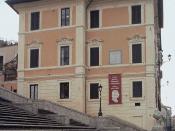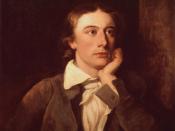The Romantic era, which was the period of time following the Enlightenment, existed to eradicate the idea that innovation, produced from research and reason, was the basis for truth. Writers of the Romantic era, such as John Keats, believed that imagination, not rationalization, was the foundation truth was built upon. Of this Keats says, "The Imagination may be compared to Adam's dream--He awoke and found it truth" (Rodriguez, Keats, 49). Even though the duration of his life was lacking, Keats must have recognized that some deductions and philosophies had a profound affect on the world. In one of his later poems, Lamia, Keats addresses this question of truth and its application to his concept of Negative Capability.
It is from Robert Burton's Anatomy of Melancholy that Keats forms the plot of Lamia (Stillinger, 359). A young man Lycius falls in love with the beautiful Lamia, whose body has been transformed from that of a serpent to that of a woman.
Lamia, with little effort, convinces Lycius to flee with her to an enchanted palace, where they live and love happily until they decide to marry. At their marriage banquet Lamia withers and dies, as Apollonius, Lycius' "sage" and "trusty guide" (II-375), is able to see through her illusion. Lycius also dies, his "arms were empty of delight" (II-307), as his dream is also shattered.
Keats multifaceted concept of Negative Capability is best understood as the following:
"that is when man is capable of being in uncertainties, mysteries, doubts, without
any irritable reaching after fact and reason." (Rodriguez, Keats, 40)
Directed to a colleague, and perhaps an extension of the previous idea Keats says:
"I am certain of nothing but the holiness of the Heart's affections and the truth of
Imagination--What the imagination seizes as beauty must be...



Alright
This is essay is ok, id give it an average grade. Nothin to impressive but its well written.
2 out of 2 people found this comment useful.